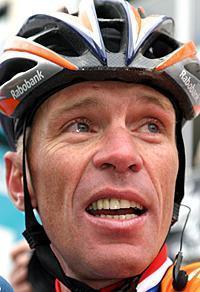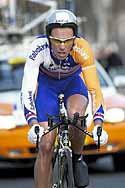
Recently on Cyclingnews.com |
An interview with Erik Dekker, April 16, 2004
Erik Dekker: "I'm a major contender"
In 2001, Rabobank's Erik Dekker won the 36th edition of Amstel Gold race, only one year after having taken the final step towards becoming one of the best known cyclists in the peloton thanks to his three Tour de France stage victories. But in 2002 and 2003, things went off the rails with two serious injuries that prevented him from riding. The comeback road has been long, and Cyclingnews' Gabriella Ekström spoke to Erik about it at his home in Belgian Meerle, located close to the Dutch border, just a few days before the 2004 Amstel Gold Race.
 |
After sweeping all before him in 2000 and 2001, Erik Dekker was at the top of professional cycling. Considered one of the best one day riders around at the time, he was all set to challenge for the World Cup in 2002. But an unfortunate accident in Milan-San Remo in 2002 left him with a broken hip and put a long, yet temporary halt to his career.
In an interview in 2002, Dekker told Cyclingnews about his recovery, and how he hoped to have put most of his rehabilitation behind him by then. Looking back, things turned out a little differently, and he would have to wait until early 2004 before being able to compete at a level he is satisfied with. Erik Dekker is now back on the scene, and sees himself as a serious contender for the only Dutch world cup race on the calendar.
"The story about my hip is a long one," says Erik, when asked about his recovery. "At first, it took seven or eight months of rehabilitation after the crash, before we could even think about starting to work on the power differences in my legs. Then, at the end of that year, I came down with a serious knee problem, and that took me another year to get over. I don't think those two injuries were connected though. I think it was just a case of bad luck."
During this year's spring season, it looked as though Erik was finding his way back to racing, especially when he helped Oscar Freire win Milan-San Remo, Rabobank's first world cup victory since Erik himself won Amstel Gold Race back in 2001.
"It wasn't until this winter where I finally felt that I could train at the same level as the other guys. I think it was at our first training camp that I realised that I was back at their level, my old level! I had been lagging behind for a long time, trying to get back to the highest level I could possibly achieve. Now I know that I have done OK, and that I haven't been this good for the last two and a half years.
 |
"I have worked really hard this winter, and at times I've been pretty anxious to see what level I would be at when the racing got going again. This winter I thought that I had a chance of reaching good form at the end of the season, but looking at my form now, I'm further ahead now than what I thought I'd be."
Amstel Gold Race, with its multiple short climbs, suits a classy rouleur like Erik Dekker like a glove. "It's a beautiful race with a course that suits me perfectly. Of course, being a Dutch World Cup makes it an important race to me and to the team, but even if it was ridden in Sweden" he says with a hint towards my origin, "it would still be a very significant race! A World Cup race always means a great deal to the sponsors, and the team that wins it, and nonetheless the rider who ends up on the podium. Except for me, we also have Michael Boogerd and Oscar Freire, who will be serious contenders for the title. The fact that we have such a wonderful team built around the race makes it even more important and exciting. It makes it a bit fun, too!"
Does it help that it's a race named after a beer, I can't help asking? "Hehe, no it's not something I think about. I think about the race, not the sponsor, even if it's a beer company," Erik says with a laugh.
Scheduled a week after Amstel is Liege-Bastogne-Liege, another world cup race that appeals to Erik. "It's the same story with Liege as with Amstel, only this time it's across the border in Belgium."
At the age of 33, having been seriously injured for almost two years, has his approach to professional cycling and his performance changed in any way? "Maybe. Yes it has. I appreciate being healthy now, being able to ride at the front. Although at some times I forget about it, and start to think that what I do is normal, but then I think again, and realise that last year at Amstel, I had to stop after 150 kilometres. I have come a long way from that."
All the way back to your old level? Are you a major contender on Sunday? "I think so. Yes, I am."
Other Cyclingnews interviews Full Amstel Gold Race coverage
